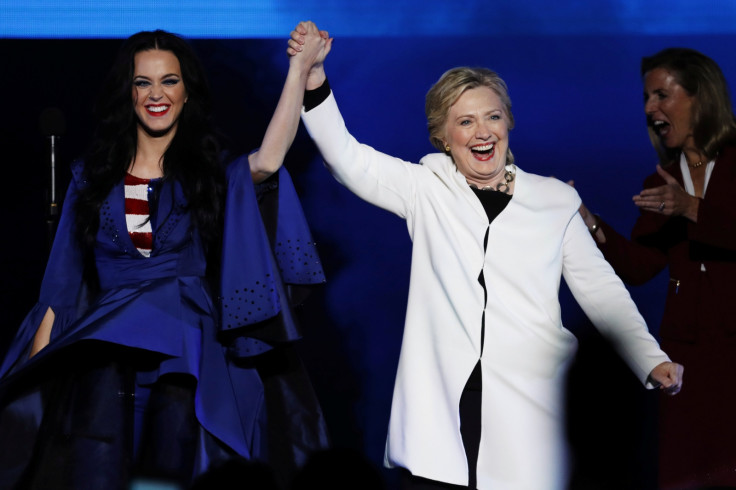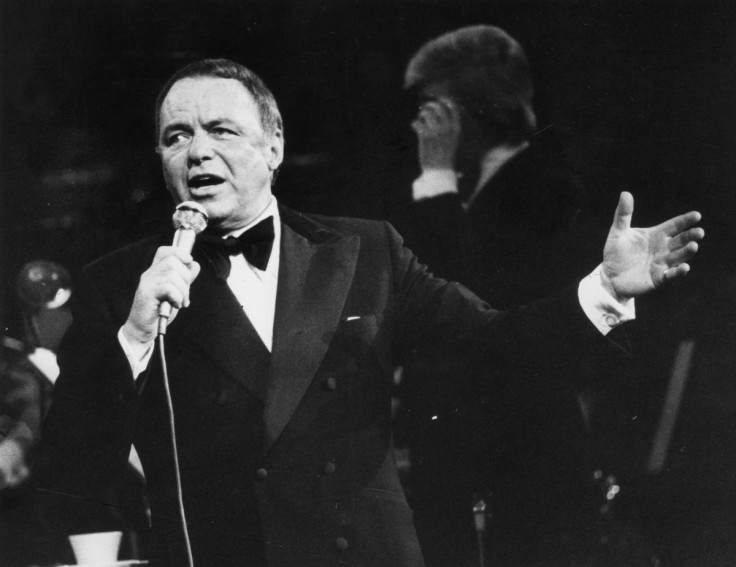The celebrity cult of personality has tainted politics – and it's not going anywhere
Celebrities are boycotting Trump's inauguration but remain as addicted to political endorsement as ever.

Katy Perry, Jon Bon Jovi, Cher, Lady Gaga, Jay Z, Beyoncé, Rihanna, Robert de Niro, George Clooney, Leonardo DiCaprio – the list goes on and on... Miley Cyrus, Taylor Swift, Pharrell Williams, Cyndi Lauper, Bruce Springsteen and many more (167 was the official count). Yes, you guessed it – they all turned out for Hillary Clinton during her failed bid for the US presidency.
The two-way appreciation-fest between centre-left politicians and the artistically-famous reached a cacophonous crescendo during the 2016 US presidential election. And the reaction of the 'slebs' since suggests they in no way blame themselves for the disaster that unfolded on the evening of 8 November.
Rather, the celebrity battalions have assumed themselves the vanguard of resistance against a "new fascism". They're boycotting Donald Trump's inauguration, having already led the collective global mourning for the loss of their... well their what, exactly, other than half of their previous fan base?
Indeed, celebrity political endorsement is worthy of scrutiny not least because – while it may seem obvious why the politicians encourage it – it's far from obvious why actors, artists and musicians deliberately and noisily alienate many of the people they rely on for their good fortune by backing one candidate (usually on the "progressive" side) over another.
Behavioural psychologists such as Gad Saad of Concordia University explain the phenomenon of people of note dedicating their free time to political causes as an extreme form of narcissism, now converted – thanks to their celebrity – into a messianic self-belief in their ability to influence others. According to this thesis, the narcissist's shamelessness in pursing popular adulation is matched only by their sense of grandiosity and self-importance.
In other words, the messianic worm inside their head – one constantly affirmed by fawning attendants and adoring fans – compels them to use their status to "make a difference". In turn, this helps them make sense of their celebrity.
Saad even posits that many celebrities suffer from an inverted version of survivor's guilt or "why me?" syndrome, making them determined to "give back" for a cause. So, just as politicians seek celebrity endorsement to legitimise their candidacy, so celebrities give endorsement to legitimise their fame.
Certainly, the politicians' motives are easier to discern. While sharing many celebrity's seething megalomania, most are dry-as-dust policy wonks. Such a combo – a desperate need for adulation combined with a zero-charisma personality – is not a great mix, hence pulling in the slebs to provide the stardust.
For the left, another reason revolves around their policy dilemmas since the 1990s emergence of Third Way or consensus (read neoliberal) economics. With centre-left parties offering little more than watered-down, welfare-heavy, versions of red-clawed capitalism, celebrities help remind voters that, yes, they're still the "good guys". So celebrities fill the vacuum where policy used to be – helping the global liberal elite look ever-more like a club of the cognoscenti, whether in business, the arts or politics.
The celebrities and the politicians cling to each other for legitimacy – one apparently demonstrating that the other isn't the insecure, self-absorbed, nutjob you suspect them to be. At least, that's until now – until the soft core of metropolitan liberalism has been blown away, remarkably, by one of their own (or at least someone tutored in their ways): the celebrity one-time liberal Manhattan billionaire Donald Trump.
The rise of the celebrity endorsement
So has Trump finally destroyed the model? Almost certainly not – it's just too ingrained. At least in the US, celebrity political endorsement can be traced – perhaps inevitably – back to the birth of globalised entertainment. Al Jolson – probably the first global superstar – backed Warren G Harding in the 1920 election, and was adjudged to have played a key part in his victory. Jolson's magic also helped keep Calvin Coolidge in 1600 Pennsylvania Avenue in 1924 – with Al even releasing a song in support (the decidedly lukewarm "Keep Cool with Coolidge").
Predictably, celebrity politicking accelerated precipitously with John F Kennedy's 1960 candidature. Frank Sinatra backed JFK's victory (though later backed Ronald Reagan), as did Ella Fitzgerald, Lena Horne, Gene Kelly, Dean Martin, Sammy Davis Jr, Henry Fonda, Judy Garland, Milton Berle, Tony Curtis, Shirley MacLaine, Nat King Cole and – most famously (and fatally) – Marilyn Monroe.

And since the 1980s the virus – if we can call it that – has spread to the UK, most notoriously in the guise of Red Wedge: a collective of musicians – fronted by Billy Bragg and Paul Weller – that aimed to "engage young people in politics" (as long as they then voted Labour, of course). The focus of the campaign was to influence the outcome of the 1987 general election, in which the Labour party went down to the third of four consecutive defeats.
That humiliation was enough for most British celebrities to resist full-on endorsement of particular parties, with the notable exception of Eddie Izzard, whose undiluted support for Labour has even become one of the more waggish explanations for the party's difficulties.
Instead – and with some understated exceptions – UK-based celebrities have latched themselves onto various cuddly causes: the explanation of which may, again, lie in the mid-1980s. Indeed, the most formative politicising of UK celebrity was the 1985 Live Aid concert fronted by Bob Geldof and Midge Ure.
Such was its success (at least in projecting politicised celebrities, if not ending African famines) that an alternative route was established for the narcissistic celebrity determined to inflict their values on us mere proles – that of the single cause.
Perhaps thanks to the Geldofs and Ures, Britain has never had to suffer the degree of partisanship of American celebrity – something that may also be explained by the fact our dominant media organisation, the BBC, has to maintain a mandated impartiality (other than in comedy it seems, though even here Labour has trouble converting cheerful left-wingery into solid endorsement).
Yet, that's not to say the UK is mercifully spared insufferable celebrity lecturing. Our penance, it seems, is served through fealty to the single-issue celebrity monster, feeding a media machine that seems to only notice issues once fronted by a Joanna Lumley, Emma Watson, Robbie Williams, Ewan McGregor etc, etc, ad nauseam.
That said, this appears to be no more than we deserve – with the media taking no notice of even the most local of causes unless suitably endorsed by someone with a familiar voice and face, even if they command only the haziest grip on the details (some proselytising platitudes will do).
We therefore appear trapped in a cycle of superficiality: with celebrities trivialising politics while the media seeks the celebrity angle in every issue – reinforcing the trivialisation. And, with every turn, the celebrities become ever more insufferable, which may go some way to explain the current backlash.
Robert Kelsey is the best-selling author of a series of "anti-self help, self help" books, including What's Stopping You?, Get Things Done and The Outside Edge. The former financial journalist and investment banker is also the deputy chairman of entrepreneurial think tank The Centre for Entrepreneurs which he co-founded with serial entrepreneur Luke Johnson.
© Copyright IBTimes 2024. All rights reserved.






